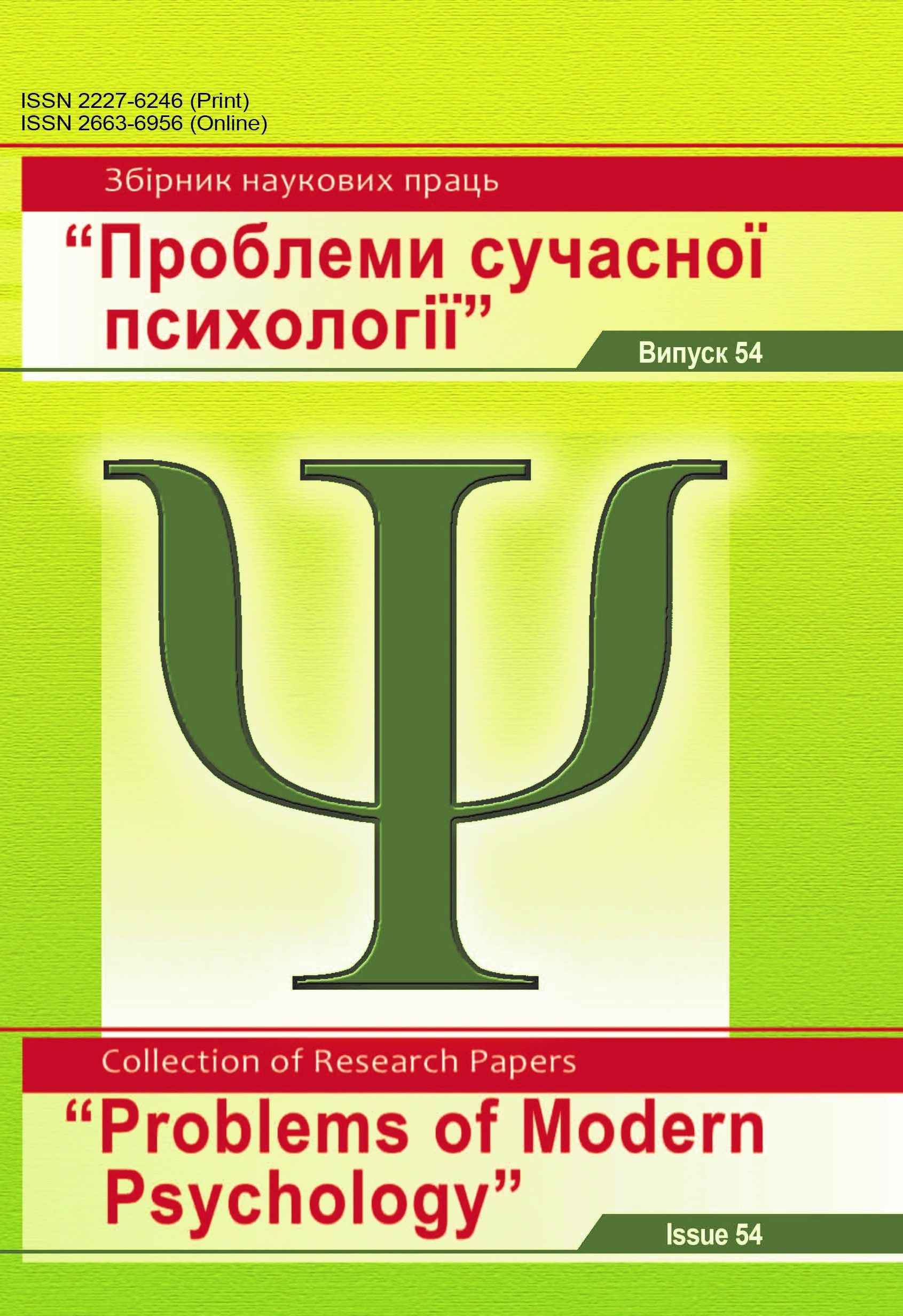Залежність виникнення математичних помилок від мисленнєвого математичного стилю
DOI:
https://doi.org/10.32626/2227-6246.2021-54.116-136Ключові слова:
творче математичне мислення, мисленнєві стилі математичного мислення, математичні помилкиАнотація
Мета статті – виявити причини виникнення математичних помилок у студентів, проаналізувати вплив математичного мисленнєвого стилю на причини виникнення та зміст математичних помилок у процесі розв’язування творчих математичних задач студентами. Для розв’язання поставлених у роботі завдань використано такий теоретичний метод дослідження: аналіз пошукових дій суб’єктів упродовж розв’язування творчих математичних задач різних класів.
Результати дослідження. Проаналізовано результати досліджень творчого математичного мислення й констатовано доцільність вивчення причин виникнення мисленнєвих помилок шляхом аналізу мисленнєвих стилів розв’язування творчих математичних задач. Визначено, що мисленнєвий математичний стиль – цілісна система взаємопов’язаних дій, за допомогою яких досягається мисленнєвий математичний результат. Установлено, що мисленнєві помилки виникали на всіх етапах пошукового процесу в студентів із різними мисленнєвими математичними стилями. Відмінності математичних мисленнєвих стилів стали основою змісту помилок. Виокремлено три групи причин виникнення мисленнєвих помилок: незнання, неякісна аналогія, нерелевантність посилань. Доведено різний вплив незнань на пошукові дії студентів із різним стилем математичного мислення. Призначено різне за змістом упровадження неякісного аналогізування при різних стилях математичного мислення. З’ясовано, що нерелевантність посилань і висновків має різний характер у мисленнєвій діяльності студентів із різними мисленнєвими математичними стилями.
Висновки. Мисленнєвий математичний стиль проявляється впродовж усього процесу розв’язування математичної задачі, забезпечує різний зміст пошукового процесу, за допомогою якого досягається позитивний математичний результат, що призводить до мисленнєвих помилок.
Посилання
Voitsekhovich, V.E. (1999). Gospodstvuiushchiie stili matematicheskogo myshleniia [Dominant styles of mathematical thinking]. Stili v matematike: sotsiokulturnaia filosofiia matematiki – Styles in mathematics: sociocultural philosophy of mathematics, (pp. 495–505). Sankt-Peterburg : RKhGI [in Russian].
Moiseienko, L.A. (2003). Psykholohiia tvorchoho matematychnoho myslennia. [Psychology of creative mathematical thinking]. Ivano-Frankivsk : Fakel [in Ukrainian].
Moliako, V.A. (2007). Tvorcheskaia konstruktologiia (prolegomeny) [Creative Constructology]. Kiiev : Osvita Ukrainy [in Ukrainian].
Perminov, V.Ya. (1999). Apriornost i realnaia znachimost iskhodnykh predstavlenii matematiki [A priory and real significance of the original concepts of mathematics]. Stili v matematike: sotsiokulturnaia filosofiia matematiki – Styles in mathematics: sociocultural philosophy of mathematics, (pp. 80–100). Sankt-Peterburg : RKhGI [in Russian].
Sultanova, L.B. (1999). Rol intuitsii i neiavnogo znaniia v formirovanii stilia matematicheskogo myshleniia [The role of intuition and tacit knowledge in the formation of the style of mathematical thinking]. Stili v matematike: sotsiokulturnaia filosofiia matematiki – Styles in mathematics: sociocultural philosophy of mathematics, (pp. 66–76). Sankt-Peterburg : RKhGI [in Russian].
Kholodnaia, M.A. (2002). Psikhologiia intellekta. Paradoksy issledovaniia [The psychology of intelligence. Research paradoxes]. Sankt-Peterburg : Piter [in Russian].
Borromeo, F.R. (2015). Mathematical thinking styles in school and across cultures. In S. Cho (Eds.). Selected regular lectures from the 12th International Congress on Mathematical Education, (pp. 153–173). Sprin-ger. Retrieved from https://doi.org/10.1007/978-3-319-17187-69 .
Fatemi, M. (2016). Relationship between thinking styles and academic achievement of the students. International Journal of Humanities and Cultural Studies, 2 (4), 1353–1361.
Huang, C.-H. (2013). Engineering students’ visual thinking of the concept of definite integral. Global Journal of Engineering Education, 1 (2), 111–117.
Jaleel, S., & Titus, B. (2015). Effectiveness of Gaming Strategy on Mathematical Creativity of Students at Secondary Level. Indian Journal of Applied Research, 5 (10), 243–245. Retrieved from https://doi.org/10.15373/22249555X .
Keşan, C., & Kaya, D. (2018). Mathematics and science self-efficacy resources as the predictor of academic success. International Online Journal of Educational Sciences, 10 (2), 45–58.
Moiseienko, L., & Shehda, L. (2021). Thinking styles of Understanding Creative Mathematical Problems in the Process of Solving. Zbirnyk naukovykh prats «Problemy suchasnoi psykholohii» – Collection of research papers, 51, 142–164. Retrieved from https://doi.org/10.32626/2227-6246.2021-51.142-164 .
Moreno-Armella, L., Hegedus, S.J., & Kaput, J.J. (2008). From static to dynamic mathematics: Historical and representational perspectives. Educational Studies in Mathematics, (pp. 99–111). Retrieved from https://doi.org/10.1007/s10649-008-9116-6 .
Ortiz, Enrique (2016). The Problem-Solving Process in a Mathematics Classroom. Transformations, 1 (1), 257–289.
Schoenfeld, A.H. (1992). Learning to think mathematically: Problem solving, metacognition, and sense-making in mathematics. Handbook for Research on Mathematics Teaching and Learning, (pp. 334–370). Nju Jork : MakMillan.
Shahbari, J.A., & Daher, W. (2016). Mathematical models’ features: Technology and non-technology. European Journal of Science and Mathematics Education, 4 (4), 523–533.
Yaftian, N. (2015). The outlook of the Mathematicians’ Creative Processes. Procedia. Social and Behavioural Sciences, 191, 2515–2519. Retrieved from https://www.journals.elsevier.com/procedia-social-and-behavioral-sciences/special-issues .
Zhang, L.F., & Zhua, C. (2011). Thinking styles and conceptions of creativity among university students. Journal of Educational Psychology, 31 (3), 361–375.
##submission.downloads##
Опубліковано
Як цитувати
Номер
Розділ
Ліцензія
Авторське право (c) 2021 Лідія Мойсеєнко, Любов Шегда

Ця робота ліцензується відповідно до Creative Commons Attribution-NonCommercial 4.0 International License.
Редакція має повне право публікувати у Збірнику оригінальні наукові статті як результати теоретичних і експериментальних досліджень, які не знаходяться на розгляді для опублікування в інших виданнях. Автор передає редколегії Збірника права на розповсюдження електронної версії статті, а також електронної версії англомовного перекладу статті (для статей українською та російською мовою) через будь-які електронні засоби (розміщення на офіційному web-сайті Збірника, в електронних базах даних, репозитаріях та ін).
Автор публікації зберігає за собою право без узгодження з редколегією та засновниками використовувати матеріали статті: а) частково чи повністю в освітніх цілях; б) для написання власних дисертацій; в) для підготовки абстрактів, доповідей конференцій та презентацій.
Автор публікації має право розміщувати електронні копії статті (у тому числі кінцеву електронну версію, завантажену з офіційного web-сайту Збірника) на:
- персональних web-ресурсах усіх Авторів (web-сайти, web-сторінки, блоги тощо);
- web-ресурсах установ, де працюють Автори (включно з електронними інституційними репозитаріями);
- некомерційних web-ресурсах відкритого доступу (наприклад, arXiv.org).
Але в усіх випадках обов’язковою є наявність бібліографічного посилання на статтю або гіперпосилання на її електронну копію, що містяться на офіційному сайті Збірника.






